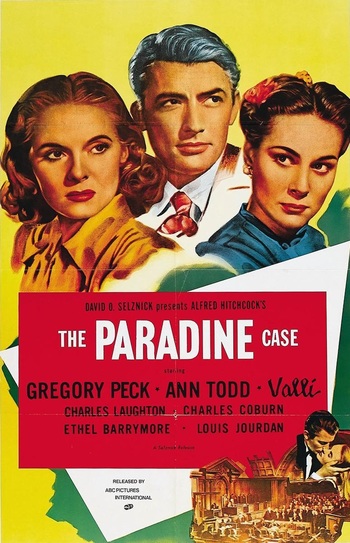
The Paradine Case is a 1947 American courtroom drama film directed by Alfred Hitchcock and produced by David O. Selznick. The film stars Gregory Peck, Alida Valli, Charles Laughton, Charles Coburn, Ethel Barrymore, and Louis Jourdan.
In London, England, Maddalena Anna Paradine (Valli) is a young woman who is accused of poisoning her older, wealthy blind husband. Anthony Keane (Peck), a brilliant and successful barrister, is assigned to defend her in court. Although Keane is married, he instantly becomes deeply infatuated with Mrs. Paradine, and it is not clear whether she is a grateful and devoted wife who has been falsely charged, or a calculating and ruthless femme fatale.
This film features examples of:
- Accidental Public Confession: Type 1. Mrs. Paradine is furious after Latour commits suicide, because as it turns out, he was her lover, and during her moment of rage to Keane blaming him for Latour's suicide, she blurts out that she poisoned her husband in order to be with Latour.
- Ambiguous Situation: It is unclear if Keane pursuits proving that Latour commited the murder because he genuinely believes he could be the true culprit, or because he only sees him as a suitable scapegoat on whom he can pin the murder and lift the blame from Mrs. Paradine.
- Betty and Veronica: Keane is torn between his kind-hearted wife Gay (Betty) and the exotic, mysterious, and fascinating Mrs. Paradine (Veronica).
- Black Widow: Mrs. Paradine is accused of poisoning her husband. Turns out it's true.
- The Butler Did It: Keane focuses on the Paradines' mysterious servant, André Latour, as the possible author of the murder. It's ultimately stated that he didn't do it, but not before killing himself.
- Driven to Suicide: Latour commits suicide after Keane accuses him of the murder.
- Gone Horribly Wrong: Keane's strategy to focus his legal efforts on pinning the murder to Latour to prove Mrs. Paradine inocent backfire horribly when Latour commits suicide, which enrages Mrs. Paradine (because he was her lover) to the point that she confesses that she did commit the murder to be with him.
- Have a Gay Old Time:
- The way Keane phrases his encounter with Latour can be taken the wrong way easily.Keane: I saw Latour. He behaved very strangely. First he avoided me, then he forced himself on me. Came to my room in the inn late at night.
- And again in court: Keane asks Mrs. Paradine if Latour tried to "make love to her", as in courtship.
- The way Keane phrases his encounter with Latour can be taken the wrong way easily.
